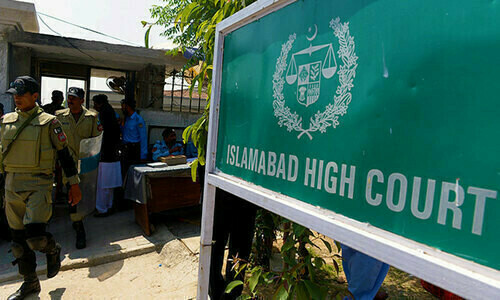ISLAMABAD: The government has assured political parties that Prime Minister Nawaz Sharif will soon brief them on key national issues, including the Pakistan-China Economic Corridor (PCEC), electoral reforms and rights of the provinces.
This was disclosed by PPP’s spokesman Senator Farhatullah Babar while briefing media on the decision taken at a meeting of political parties held at the Zardari House here on Thursday.
“Finance Minister Ishaq Dar told the meeting that the prime minister, after his return from abroad, will convene a meeting to take all political forces into confidence on key national issues – PCEC project, election reforms, rights of the provinces and NFC award – to develop a consensus on how to overcome hurdles in these matters,” Mr Babar said.
He said that all important issues had been discussed at the meeting, which lasted three-and-a-half hours.
PPP Information Secretary Qamar Zaman Kaira said the main reason for holding the meeting of political parties was that some objections were being raised to mega development projects and other important matters.
He said the government side had assured the meeting that all issues would be resolved through consensus and a ‘charter of economy’ would also be presented by the prime minister.
“Asif Ali Zardari was quite worried about the objections which are being raised on national issues and projects and, therefore, he decided to hold the meeting of mainstream political parties,” he said.
The Muttahida Qaumi Movement and Jamaat-i-Islami did not attend the meeting because they were busy in a by-election in Karachi.
PPP leader Sherry Rehman said the meeting had also discussed the National Action Plan (NAP) on counter-terrorism.
PPP Co-Chairman and former president Asif Zardari managed to bring political foes and friends to one table for a threadbare discussion on the alleged change in the PCEC route and other contentious issues.
PTI Vice President Shah Mehmood Qureshi, once a disgruntled PPP leader, sat in front of Mr Zardari. JUI-F chief Maulana Fazlur Rehman, one of the biggest critics of PTI, sat next to Mr Qureshi.
The meeting was also attended by Information Minister Pervez Rashid, former prime ministers Yousuf Raza Gilani and Raja Pervez Ashraf, PTI’s Shafqat Mehmood, ANP chief Asfandyar Wali Khan and Ghulam Ahmed Bilour, PML-Q’s Mushahid Hussain Syed, Aftab Ahmed Sherpao, Mehmood Achakzai and Israrullah Zehri.
A press release issued by the Zardari House said the meeting turned into an informal forum of parties across the political divide to discuss issues of national importance.
In his opening remarks, Mr Zardari stressed the need for developing a political consensus on issues of national importance based on transparency. He was quoted as saying: “Without a broad-based political ownership of mega economic projects and policies, the national economy will not make progress.”
He said it was important that political forces joined hands, identified issues of critical importance and sought to develop consensus on them and raised the threshold of mutual tolerance.
Almost all nationalist parties, the JUI-F, PTI and PPP opposed proposed changes in the PCEC route and demanded that the original alignment of the corridor be retained.
The political parties, mainly from Khyber Pakhtunkhwa and Balochistan, have been protesting against the alleged plan of the government to exclude backward areas of the two provinces from the original project only to ‘benefit’ Punjab.
Prime Minister Sharif, in his speech in a joint sitting of parliament on Tuesday, tried to pacify political parties agitating over changes in the route by saying that the project would benefit the whole country.
While giving a vote of thanks to Chinese President Xi Jinping, the prime minister had said: “This is a catalytic project that will help us combine the geo-strategic and geo-economic streams of our relationship. It will benefit the entire country and all the provinces — Balochistan, Sindh, Punjab, Khyber-Pakhtunkhwa, Gilgit-Baltistan and Azad Jammu and Kashmir.”
Balochistan Chief Minister Dr Abdul Malik had said last month that he would take up the issue with the federal government.
Planning and Development Minister Ahsan Iqbal, in a written reply to a question raised in the National Assembly, said that no change had been made in the original route of the corridor which would connect the nodes of growth centres.
He said that significant nodes along the corridor would be Kashgar, Khunjerab, Peshawar, Islamabad, Lahore, D.I. Khan. Multan, Sukkur, Quetta, Karachi and Gwadar. Other nodes and growth centres might fall within the PCEC in future.
Published in Dawn, April 24th, 2015
On a mobile phone? Get the Dawn Mobile App: Apple Store | Google Play











































